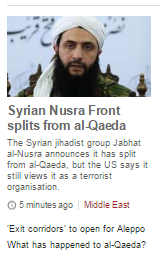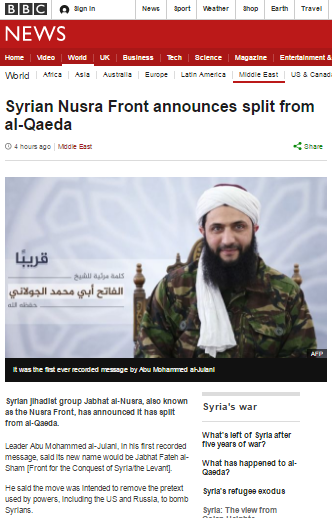Those visiting the BBC News website’s Middle East page on the morning of July 29th learned the following:

The article to which that link leads is titled “Syrian Nusra Front announces split from al-Qaeda” and readers are told that:
“Syrian jihadist group Jabhat al-Nusra, also known as the Nusra Front, has announced it has split from al-Qaeda.
Leader Abu Mohammed al-Julani, in his first recorded message, said its new name would be Jabhat Fateh al-Sham [Front for the Conquest of Syria/the Levant].
He said the move was intended to remove the pretext used by powers, including the US and Russia, to bomb Syrians.”
But is the repeated claim that Jabhat al-Nusra has “split from al-Qaeda” an accurate representation of what actually happened? A senior fellow at the FDD doesn’t think so and his analysis (which includes a mention of this BBC article) is well worth reading in full.
“…Al Nusrah’s overt relationship with al Qaeda made it easy for Russia and the US to justify bombing Syria. For this reason, others in the Syrian insurgency objected to Al Nusrah’s status as an al Qaeda branch. (To date, American airstrikes have mainly targeted individual al Qaeda leaders embedded in Al Nusrah’s ranks, not the organization’s overall paramilitary force. However, the proposal for cooperation with Russia may have led to a change in that focus.)
Julani and Al Nusrah’s other leaders are sensitive to the complaint and so they wanted to eliminate this supposed pretext.
“For the aforementioned reasons, we declare the complete cancellation of all operations under the name of Jabhat Al Nusrah, and the formation of a new group operating under the name ‘Jabhat Fath Al Sham,’ noting that this new organization has no affiliation to any external entity,” Julani says.
Press outlets and many analysts seized on this phrasing to argue that Julani had announced Al Nusrah’s “split,” or “break” from al Qaeda. Some even reported that Julani had thanked “commanders of al Qaeda for having understood the need to break ties.”
But that is not what Julani actually said. His remarks were far more nuanced and require careful analysis.
Julani did not explicitly say that Al Nusrah had broken or split from al Qaeda, which is the language used by the press. He made no such claims.
Instead, Julani said Jabhat Fath Al Sham would have “no affiliation to any external [or foreign] entity.” If Julani wanted to argue that he and his men no longer had any ties to al Qaeda, he could have said so. He didn’t. And his precise wording allows for a considerable amount of wiggle room.”
Later on in the BBC’s article readers are told that:
“Analysts say the Nusra Front decided to rebrand itself after the US and Russia stepped up their military efforts against the group.
It is understood the group hopes to form closer alliances with other Islamist groups fighting in Syria.”
The article goes on to offer readers a link to a previous BBC report from March 2015.
“Al-Nusra first announced its existence in a video posted online in early 2012, some months after the Syrian civil war began.
It has been claimed that Qatar has relatively close ties with the group, probably through intermediaries.”
In that article (previously discussed here) audiences were told that:
“This is why Qatar is hoping to bring the Nusra Front in from the cold. If the state can get the group to eschew its al-Qaeda affiliation and adhere to a broadly moderate Islamist platform, Qatar can officially commence, with Western blessing, the supply of one of the most effective fighting forces in Syria.” [emphasis added]
But does Jabhat al-Nusra’s rebranding and potential “closer alliances” with additional groups really signal a step down the road to ‘moderation’? Analyst Jennifer Cafarella does not think so:
“The cancellation of Jabhat al Nusra’s operations and rebranding of Jabhat al Nusra fighters does not remove the group from the global Salafi-jihadi movement, which believes in the use of violence to establish shari’a-based governance. Jabhat al Nusra will continue to fight to advance Syrian Salafi-jihadi interests under its new name. It has not renounced its vision of establishing an Islamic emirate in Syria. It has instead improved its chances of success by removing obstacles to unify the opposition under its leadership.
Syrian Salafi-jihadi groups want to unify opposition groups to increase the effectiveness of their war against the Assad regime. U.S. Director of National Intelligence James Clapper today noted that the formation of Jabhat Fatah al Sham likely aimed to “create the image of being more moderate in an attempt to unify and galvanize and appeal to other oppositionist (sic) groups in Syria.” […]
The decision to form Jabhat Fatah al Sham removes the primary source of the opposition’s resistance to a merger. Opposition groups have been hesitant to merge with Jabhat al Nusra for fear that affiliation with an al Qaeda branch would justify Russia’s air campaign and cause the U.S.-led coalition to target them. […]
It was certainly part of a plan coordinated with al Qaeda’s central leadership. Al Qaeda sanctioned the decision to form a new group in a message released today. This was no break from al Qaeda, but rather the execution of a deliberate global strategy on behalf of the movement. The al Qaeda statement emphasized that “the brotherhood of Islam that is between us is stronger than all the finite, ever-changing organizational links.” “
At the time of writing, the BBC’s profile of Jabhat al-Nusra has not been updated to include this latest development or to correct previously noted inaccuracies.
Related Articles:
Confusing and conflicting messaging on Jabhat al Nusra in BBC reports


